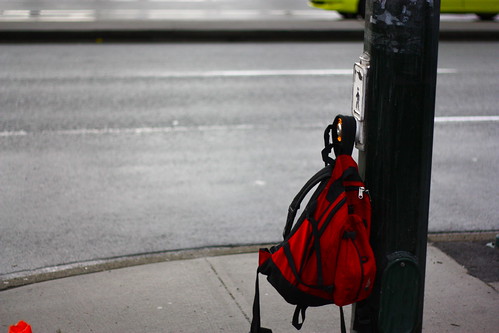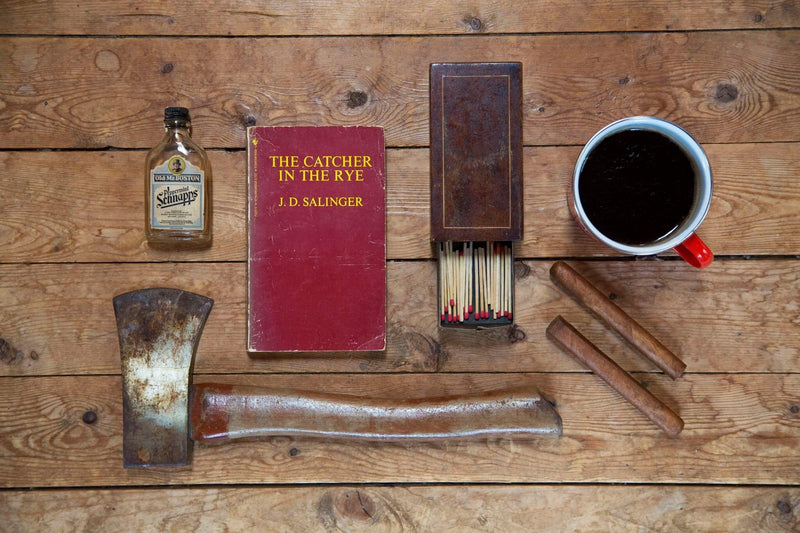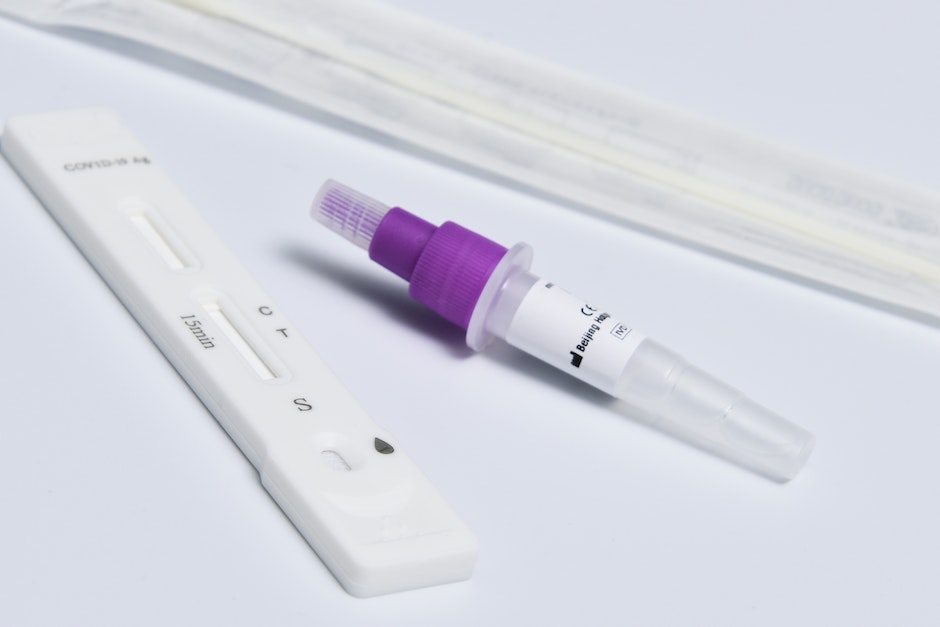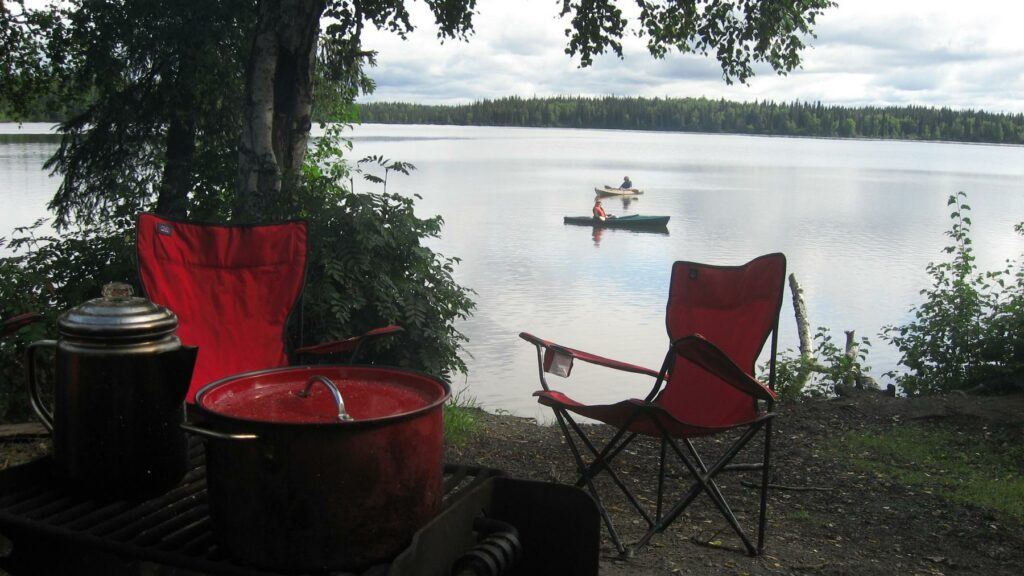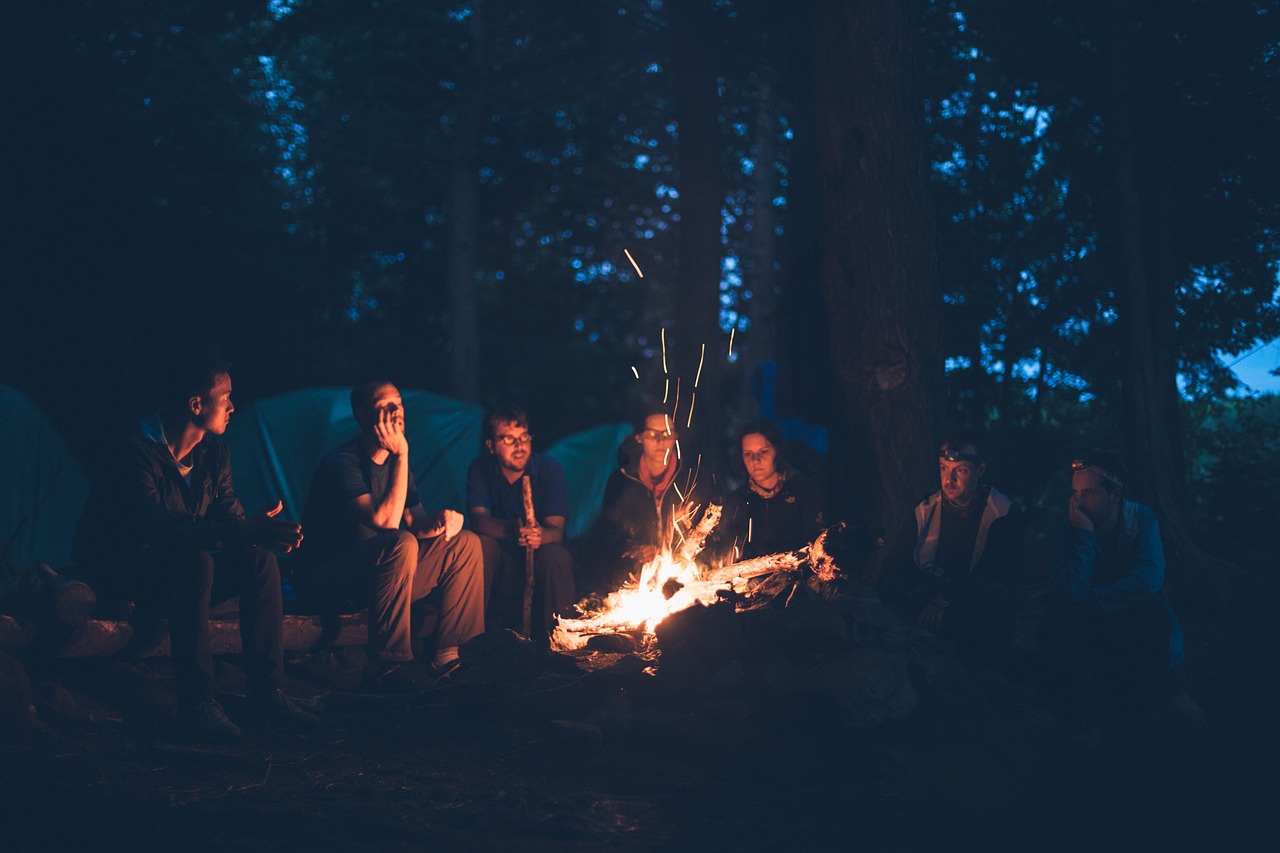
admin
The Ultimate Camping Essentials For Beginners Guide
Camping is a great way to enjoy the outdoors, but it’s important to be prepared before you head out into the wilderness. In this blog post, we’ll cover everything you need to know to get started camping, from safety tips to essential gear. We’ll also provide some suggestions for entertainment so you can make the most of your time in nature. So whether you’re a first-time camper or an experienced outdoorsman, this guide will help you make the most of your camping trip.
Safety First: A Beginner’s Guide to Camping Safety
Camping can be an exciting and fun experience, but it’s important to take safety precautions first. Always be aware of your surroundings and take the necessary precautions to avoid dangerous wildlife. Make sure you know how to start a fire before camping, and pack enough food and water to last you the trip. Finally, tell someone where you’re going and when you’ll be back before camping. This way, if something does go wrong, they’ll be able to find you pretty easily. camping is a great way to get outdoors and enjoy the great outdoors, but it’s important to be safe first!
Choose a safe campsite
Camping can be a great experience, but it’s important to choose a campsite that is safe and devoid of any potential dangers. Avoid camping in areas with dense foliage as these can act as hiding spots for wild animals. Make sure the area you are choosing has well-lit areas so you won’t have any problems spotting anything that might pose a threat.
When sleeping outdoors, always take necessary precautions such as storing your food properly and making sure to put out the campfire before going to sleep. Finally, never leave children or pets unattended while camping – even if they stay inside the car!
Be aware of your surroundings
Camping is a great way to get away from the daily grind and experience the wilderness first-hand. However, it is important to be aware of your surroundings at all times in order not to fall victim to any dangerous animals or plants that you might not be familiar with.
Moreover, always make sure that someone knows where you are going when camping – no one wants an unplanned trip back home! And lastly, never leave campfire unattended as this can lead to serious accidents.
Don’t leave food out
Camping is a great way to get outdoors and experience nature, but it’s important not to leave food out. This can attract animals who might then rummage through your belongings or worse, cause an accident.
To make sure you have a safe trip, keep all food in airtight containers and stored away properly. If you do have any leftover food, make sure to dispose of it properly – preferably by burying it underground!
What to Bring Camping: The Ultimate Camping Packing List
Camping is a great way to get out and experience nature, but it can be tricky to know what to bring. That’s why we’ve put together the ultimate camping essentials for beginners guide. In it, you’ll learn about the different items that should be included in your camping packing list, as well as advice on how to choose the right gear for the weather conditions you’ll be camping in. Be prepared for an adventure, and gear up with the essentials!
A Tent
Camping is a great way to spend time with family and friends. It allows you to get away from the hustle and bustle of everyday life, connect with nature, and experience new things.
While camping isn’t just about sleeping in a tent – it’s also about being able to cook your meals outdoors over an open fire or enjoying a relaxing campfire session under the stars. In order not to have any trouble while camping, make sure you gear up well beforehand by having the right essentials such as tents, backpacks, sleeping bags etc.
Sleeping Bag
Camping is a great way to get outside and enjoy the natural surroundings. However, if you’re heading camping with friends or family, make sure that everyone has their sleeping bag ready!
A good sleeping bag should be lightweight and waterproof; it should also be comfortable enough to sleep in for hours on end. Sleeping bags come in different shapes and sizes – so choose the one that best suits your needs. You might want something compact if you’re only going out for a short trip, while someone who camps often might prefer something bigger and more spacious. Make sure to pack a pillow too just in case you find yourself waking up extremely sore from head-to-toe stiffness!
Hiking Boots or Shoes
Hiking boots or shoes are an essential for any camping trip – they will protect your feet from the elements and keep you comfortable while walking.
Make sure to break in your hiking boots or shoes before going on a camping trip – no one wants blisters! There are a lot of different types of hiking boots and shoes, so it’s important to pick the right kind for you.
Headlamp or Flashlight
Camping gear doesn’t get much more essential than a headlamp or flashlight. Not only do they come in handy when you’re hiking in the woods at night, but headlamps also come in handy when you’re camping – especially if there’s no electricity around.
As with anything else, it is important to choose a light source that will allow you to see clearly and safely while camping. A good option would be a headlamp that comes with an adjustable beam so you can focus the illumination where it is needed most. In addition, make sure your headlamp or flashlight has enough battery life for sustained use – preferably 500-600 hours of runtime on low setting!
Basic Medical Skills Every Camper Should Know
Camping can be an exciting and exhilarating experience, but it’s important to keep your head on straight. That’s why it’s essential to know basic medical skills. This includes knowing how to treat minor cuts and scrapes, bug bites and stings, and more serious injuries. If someone in your group has a more serious injury, be sure to know first aid skills. In addition, be sure to have a list of emergency numbers handy in case of an accident or illness. camping can be a fun and safe experience, but it’s important to take the necessary precautions to ensure a safe and memorable trip.
How to deal with blisters
Camping in the great outdoors can be incredibly fun, but it’s also prone to some uncomfortable moments. One of these is when you get a blister – this isn’t just an irritating little bump, but rather a painful and tender inflamed skin eruption.
If you’re unlucky enough to experience one of these pesky blisters, there are a few things that you can do to help make your trip more bearable. Firstly, clean the area with soap and water as this will help reduce the inflammation and speed up the healing process. Next comes applying bandages or other forms of protection so that the blister doesn’t hurt too much when touched or walked on. If it’s large or extremely painful, seek medical attention ASAP as blisters can easily become infected if not treated promptly!
Treating minor burns
Minor burns can be treated easily and effectively with a few simple steps.
To start, hold the affected area under cool running water for at least five minutes. If the pain persists, you can take over-the-counter pain medication like ibuprofen or acetaminophen. Be sure to keep the affected area clean and dry, and apply a sterile bandage if needed.
Dealing with insect bites and stings
It can be really scary when you are bit or stung by an insect, as the pain and swelling can be intense. However, there are a few things that you can do to make the experience less traumatic.
First of all, learn which insects bite and sting people most often. This will help you identify the type of treatment that is required for the particular bug-man or bug-woman! Secondly, if you know that you are allergic to any kind of sting or bite, carry with yourself an EpiPen at all times in case of a serious reaction. Finally, if signs of a more serious reaction develop (e.g., difficulty breathing etc.), head to a hospital immediately!
Caring for cuts and scrapes
Cleaning and caring for cuts and scrapes is an essential part of good health. Here are four tips to help you keep your wounds clean and healthy:
1. Before you start cleaning the wound, make sure to wash your hands thoroughly with soap and water. This will minimise the chances of picking up harmful bacteria that can cause infection.
2. Apply pressure to the wound with a clean cloth to stop the bleeding. This helps in preventing further injury or loss of blood flow, which can lead to swelling and complications down the line.
3. Once the bleeding has stopped, gently clean the wound with warm water and soap – making sure not to rub too hard as this could damage tissues inside the wound area。
4 Finally, apply antibiotic ointment if available before covering it with a sterile bandage or gauze pad
What to do if someone has a seizure
If you witness someone having a seizure, the first thing to do is stay calm and avoid helping them in any way. You shouldn’t try to stop their body from shaking – this could make the seizure worse.
Once the seizure has passed, help them to lie down as quickly as possible and clear away any potential hazards around them. Do not put anything in their mouth; if they are vomiting or retching, it can cause more harm than good. If possible, contact emergency services immediately afterwards.
Entertainment
Camping can be a fun, exciting, and educational experience. But it can be quite dull if you don’t have any good entertainment. This includes books, games, cards, and other activities that can keep you busy. Make sure to pack enough for everyone in your group so that everyone has something to do. And don’t forget about bringing entertainment for after dark – flashlights and glow sticks are always fun!
A Good Playlist
Camping is an experience that everyone should try at least once. It’s the perfect time to spend outdoors with friends and relax in nature. However, before camping can truly be enjoyable, you need to have the right playlist loaded on your phone or iPod.
Make sure to include a mix of genres – something for every music lover out there. And if you’re feeling nostalgic, compile a playlist of oldies but goodies! No trip is complete without great tunes and good company – so make sure to pack everything you need (and maybe some extra!) along with your gear bag when heading outdoors this summer.
Stargazing
Stargazing is a popular pastime enjoyed by people of all ages, no matter where they are in the world. It doesn’t require any special gear or expertise, just some patience and an open sky.
camping life has never been so peaceful and heavenly! All you need to experience this wonderful activity is a clear night sky, some time on your hands, and maybe a picnic blanket – because sleeping outdoors under the stars just isn’t enough!
Frequently Asked Questions
How can I avoid getting bitten by bugs while camping?
Here are some tips to avoid getting bitten by bugs while camping:
– Wear long-sleeved shirts and pants to minimize the amount of exposed skin. Apply an insect repellent containing DEET or picaridin to any exposed areas of skin.
– Avoid sweet scented personal care products, perfumes, and colognes as these can attract bugs.
– Make sure you pitch your tent away from standing water and areas of dense vegetation. Keep food sealed in airtight containers and dispose of garbage properly.
What should I pack for food and drinks when camping?
When packing food and drinks for camping, always bring non-perishable items that will not spoil easily. Canned goods, peanut butter, and dried fruits are all excellent choices.
It’s also a good idea to bring along protein-rich foods like nuts, tuna, beef jerky, and energy bars. These will help to keep you full and satisfied during your camping trip.
Of course, water is essential for camping. Bring plenty of water bottles and consider adding electrolyte beverages and juices to your cooler for added hydration.
And last but not least, don’t forget the condiments! Mayonnaise and ketchup can add some much-needed flavor to campfire meals.
What should I do if I encounter an animal while camping?
If you encounter an animal while camping, the best thing to do is remain still and quiet in order not to startle it. Avoid making direct eye contact and slowly back away. Do not approach or attempt to interact with the animal, no matter how friendly it may seem.
If the animal feels threatened by you, it may become aggressive. To avoid this, make loud noises or throw rocks in its direction. This will hopefully scare it off and allow you to safely move away from the area.
Conclusion
Camping is a great way to enjoy the outdoors, but it’s important to be prepared before you head out. This beginner’s guide to camping essentials will help you make sure you have everything you need for a safe and fun trip. From camping gear and clothing to entertainment and first-aid, we’ve got you covered! So, what are you waiting for? Start packing and get ready for an adventure!
You might also enjoy
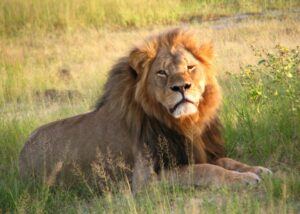
Group Camping in Alabama: Your Complete Guide
Discover the Best Group Camping Sites in Alabama: A Complete Guide
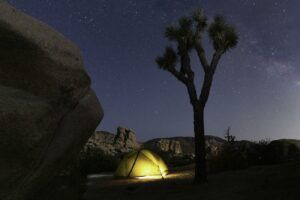
National Parks Group Camping: Top Areas to Pitch Your Tent
Discover the Best Group Camping Areas in National Parks and Plan your Next Adventure Today!
Group Camping Activities for Youth: A Comprehensive Guide
Make your youth group camping trip unforgettable with our guide to outdoor team building activities, fun games, and more!







